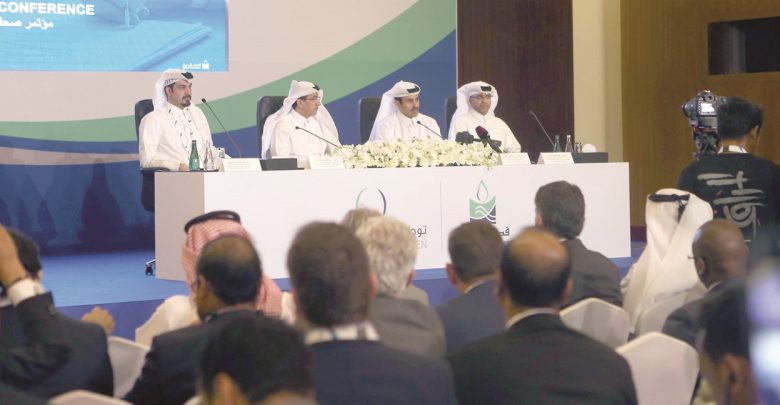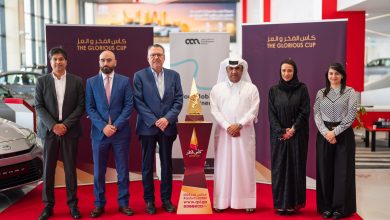
Qatar to acquire up to 60 new LNG vessels
قطر بحاجة إلى نحو 60 ناقلة غاز إضافية لمواجهة نمو انتاج «المسال»
Minister of State for Energy Affairs and the President and CEO of Qatar Petroleum, H E Saad bin Sherida Al Kaabi, said yesterday that Qatar will be acquiring a substantial number of LNG vessels to transport the increased output of gas (the post-moratorium volumes). It may require up to 60 additional ships which will be depending on various factors.
H E Al Kaabi also said that it is still very fluid, and the exact number will become clearer with time as how many vessels will be required to transport the additional volume of nearly 50 million tonnes of LNG which will depend on customers’ destinations, size of contracts and vessels and many other factors.
“It should be between 50 and 60 vessels that we will require to transport the expanded output of LNG which will increase from 77 million tonnes per day (mtpa) to 110mtpa by 2024. It will be very substantial number, but things will become clear with time,” said H E Al Kaabi in response to a question at a press conference held yesterday on the sidelines of the launch of TAWTEEN programme, a Qatar Petroleum initiative to enhance localising supply chain in the energy industry to support SMEs.
He added: “We have a dedicated team of experts who are already working on that element (to acquiring vessels). They have visited different shipbuilders around the world. There will be international tenders put in place to procure the ships. Everything is going ahead as per the plan.”
Currently, Nakilat, a Qatari-owned shipping and maritime company, is providing the critical transportation link in Qatar’s LNG supply chain. The company’s LNG shipping fleet is the largest in the world, comprising of 65 LNG vessels.
In addition to its core shipping activities, Nakilat operates the ship repair and construction facilities at Erhama Bin Jaber Al Jalahma Shipyard in Ras Laffan Industrial City via two strategic joint ventures: Nakilat-Keppel Offshore & Marine (N-KOM) and Nakilat Damen Shipyards Qatar (NDSQ).
Asked if any of those vessels could be built locally at the shipyard, he said that it is a state-of- the-art facility which does a lot of maintenance and repair works for ships and provide many other services to the industry but building LNG vessels in Qatar will not be price competitive and feasible.
“As far as the shipbuilding is concerned, we tried a bit in the past and realised that it is more successful when you have your own materials and huge manpower available at reasonable prices. But when you depend on imports, especially for building huge LNG vessels, it’s not economically feasible. So it will be done by others,” he explained.
He further said: “We built all our ships in South Korea in the past, so we are looking at South Korean companies and others to bid and meet our shipbuilding requirements in the future… And our local shipyard facility will continue providing other services, and also be used for the construction of offshore structures.” Commenting on the proposed new LNG trains and possible partners for the expansion project in the North Field, he said that QP is already moving full steam ahead alone.
“We are going to expand our LNG production from 77 mtpa to 110 mtpa in Qatar and 16 mtpa abroad (in the US) with the total revised volume reaching at 126 mtpa within 4-5 years,” he noted, adding that a lot of works related to the expansion project are going to be completed by next month, and contracts for onshore rigs, jackets and other engineering works are going to be announced very soon.
On selecting partners for the LNG expansion project, he said that QP will decide by the end of this year. However, it is open to go alone in case it doesn’t get right partners. “We like partnership model, but my job is to get the best and maximum value for the State of Qatar. We don’t need money; we don’t need investment; and we also don’t need know-how. What we need are good partners who can reciprocate value,” said the Minister, who is a professionally trained engineer with over three decades of experience in serving the oil and gas industry.
By Mohammad Shoeb I The Peninsula
قدّر سعادة المهندس سعد بن شريده الكعبي وزير الدولة لشؤون الطاقة العضو المنتدب والرئيس التنفيذي لـ «قطر للبترول»، عدد السفن التي تحتاجها قطر لنقل مختلف المواد التي تقوم بتصديرها -بعد ارتفاع مستويات الإنتاج من الغاز الطبيعي المسال- بنحو 50 ناقلة متنوعة في أحجامها وطبيعة المواد التي تنقلها. مشيراً إلى أن العدد قد يزيد أو يقل وفقاً للخطط النهائية التي يجري العمل عليها حالياً.
ولفت سعادته خلال المؤتمر الصحافي الذي عُقد على هامش إطلاق برنامج «توطين»، إلى أن حجم المتوقع لإنتاج الغاز المسال لدولة قطر بعد تنفيذ خطط زيادة الإنتاج وإضافة 4 خطوط عملاقة لإنتاج الغاز الطبيعي المسال، سيصل إلى 110 ملايين طن سنوياً، هذا بالإضافة إلى نحو 16 مليون طن سنوياً حجم إنتاج «قطر للبترول» من جراء مشروع «جولدن باس»، ليصل إجمالي إنتاج «قطر للبترول» من الغاز الطبيعي المسال إلى نحو 126 مليون طن.
وبشأن أحدث التطويرات لمشروع زيادة إنتاج الغاز، أفاد بأن عمليات طرح المناقصات للمشروع وإعلان الفائز بها سيكون قريباً، وستتم جميعها خلال العام الحالي.
اتفاقيات شراكة
وتم أمس توقيع عدد من اتفاقيات الشراكة بين شركات قطرية وأجنبية لإنشاء مشاريع في قطر، حيث قال سعادته في هذا الشأن: «يصعب تحديد حجم الاستثمارات التي تهم تلك الاتفاقيات؛ نظراً لكونها تتضمن تقديم العديد من الخدمات، وليست مقتصرة على تزويد بوحدات صناعية أو ما شابه».
وقدّر الكعبي حجم الاتفاقيات التي وقّعتها «قطر للبترول» بقيمة تزيد على 9 مليارات ريال مع شركتي خدمات النفط «شلومبرجر» و»بيكر هيوز» لدعم قطاع الطاقة المحلي.
وقال سعادته إنه في إطار واجب «قطر للبترول» الوطني لتطوير القطاع في قطر وتعزيز الاعتماد على الذات، فإن هناك حاجة لتوطين كثير من الصناعات المساعدة في القطاع. موضحاً أن الاتفاقات الأولية ستتضمن الاستثمار في منشآت الإنتاج والتدريب والتطوير.
وأكد الكعبي أن دولة قطر لديها إمكانات هائلة في قطاع البنية التحتية تجعلها دائماً مقصداً للعديد من الاستثمارات المتنوعة التي تستفيد من تلك الإمكانات وتمكّنها من بناء أعمال جاذبة وفعّالة في الدولة، وهو ما يعود بالنفع على اقتصاد الدولة، وخاصة القطاع الخاص.
كما أضاف الكعبي أن قطر تتوقع توفير نحو 9 مليارات ريال سنوياً عبر إحلال الواردات بعد توسعة قطاع الطاقة المحلي بها، وعبر طرح نحو 100 فرصة استثمارية، قائلاً إن تلك الفرص ستمكّن من توفير العديد من السلع والخدمات التي كان يحتاجها قطاع الطاقة من الخارج. وأفاد بأن «قطر للبترول» تسعى لإقامة تلك المشاريع داخل الدولة عن طريق جذب استثمارات متزايدة، تساهم في تعزيز التنافسية، وتوفر أسعاراً أفضل بالنسبة للخدمات أو السلع التي تحتاجها «قطر للبترول» وتعود بالنفع على القطاع الخاص بالدولة.
وأضاف أن «قطر للبترول» تسعى دائماً لدعم القطاع الخاص والمورّدين المحليين؛ الأمر الذي يصبّ في مصلحة اقتصاد الدولة، ويتماشى مع سياسة الدولة في دعم القطاع الخاص.
بناء السفن
وحول سعي «قطر للبترول» لبناء مزيد من الناقلات، أوضح الكعبي أن «ناقلات» لديها حوض مجهّز وضخم لبناء السفن في مدينة راس لفان الصناعية، وتمكنت مع شركائها من بناء العديد من السفن، مستفيدة بما لديها من خبرات وتكلفة منخفضة في المواد الأولية والقوة العاملة التي لديها، إلا أن بناء ناقلات الغاز يحتاج عدداً كبيراً من العمالة الماهرة؛ الأمر الذي يجعل من هذا النشاط غير مجدٍ تجارياً، وهو ما يجعل «قطر للبترول» تتجه في الغالب نحو كوريا الجنوبية، والتي لديها باع أوسع في هذا المجال.;



